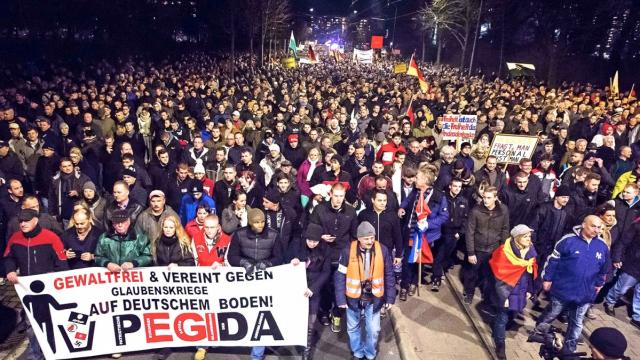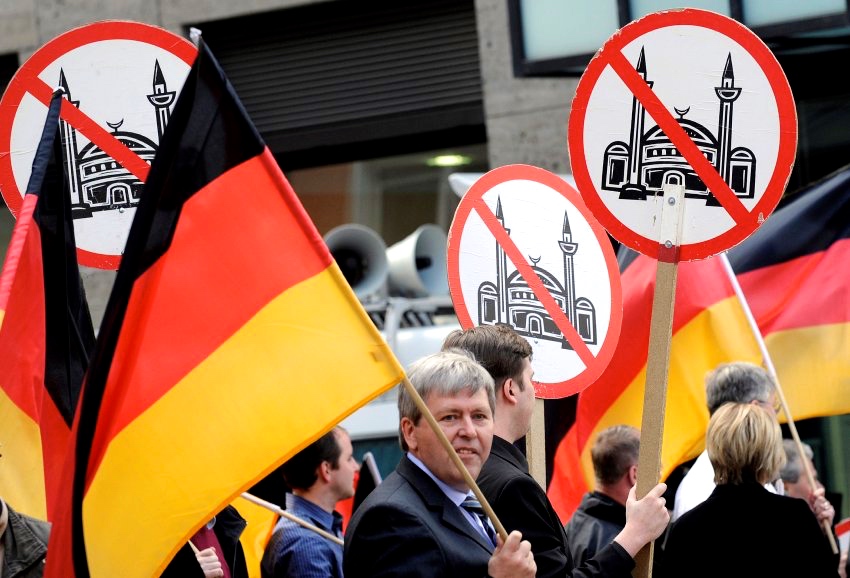
On Monday evenings Germans in many cities across the country have been gathering for months to oppose the supposed Islamization of Germany. Centered in the eastern city of Dresden, a diffuse, until recently unknown group called Patriotische Europäer gegen eine Islamisierung des Abendlandes (Patriotic Europeans Against the Islamization of the West, or PEGIDA) is at its forefront. The Dresden protests — 17,500 turned out one evening last week — are the biggest anti-Islam rallies anywhere in Europe. They are particularly unnerving because until recently anti-Islamic prejudice in Germany, in contrast to other European countries such as France and Britain, remained relatively closeted. But this changed dramatically in 2014.
Germany’s protests are deeply worrying, though not because there’s a possibility of these forces coming to power, as the Nazis did in the 1930s or far-right parties have in coalition governments elsewhere in Europe. These currents do not appeal to anything close to a majority of Germans, and mainstream parties are unwilling to cooperate with them.
But the demonstrations reveal a tenacious illiberal strain in Germany — and across the rest of Europe — that, much like anti-Semitism in the past, employs rigorous scapegoating and fear of the other, in this case Muslim immigrants, to express legitimate concerns over issues such as international financial crises, the lost or threatened social status of the middle classes, unemployment and violent crime. And now, in contrast to just a year ago, there’s a populist party in Germany that is tapping this current, making its way into regional parliaments in one vote after another, with about 10 percent of the vote.
Creeping Islamophobia
It is still unclear whether PEGIDA is a bona fide social movement in the making or just a populist flash mob that will fizzle out. But the rise of Islamophobia has enormous consequences for the quality of democracy in Europe, especially at a time when there are more migrants than ever fleeing conflicts and counting on Europe to extend a hand.
It’s particularly unsettling that the center of the PEGIDA phenomenon is Dresden, which is the poster child of eastern Germany’s economic revival and boasts only about 0.4 percent Muslims. By contrast, Muslims account for 12 percent of Frankfurt’s population and 9 percent of Berlin’s. Moreover, locales much smaller than big-city Dresden have been taking in many times the number of refugees from war-torn Syria and elsewhere as Dresden has.
So far, the organizers of PEGIDA and most marchers aren’t speaking much to journalists, whom they charge are conduits of the government’s (and all the established parties’) misinformation. But their posters and remarks reflect a deeply irrational and racist stripe of populism. About half the banners at these marches address Islam (“Peacefully united against religious wars on German soil,” “Against religious fanaticism” and “No Sharia in Europe”). Others go beyond Islamophobia to the staples of beer-hall populism (“More money for our kids, not asylum seekers and Gypsies” and “For the preservation of our culture” and “Media lies, media lies”). Some of their messages even riff on the slogans of the peaceful revolution of 1989, such as “We are the people” and “Freedom is the freedom to think differently.”
What’s not surprising is that anti-Islamic sentiment in Germany, rife on the Internet for years, has finally spilled into the streets. Opinion polls have long shown high anti-Islamic bias among Germans — numbers roughly the same as those across Northern Europe. In a survey conducted by the Forsa Institute for Social Research and Statistical Analysis, 52 percent of Germans said, “Islam doesn’t belong to Germany” (60 percent among easterners, 61 percent among young people, 61 percent among seniors). A similar study by the University of Leipzig found an upswing in anti-Muslim, anti-immigrant and anti-Roma sentiments across Germany, with 43 percent of Germans saying they felt alienated because of the presence of large numbers of Muslims in the country.
Islamophobia in Germany can be so widespread because — unlike anti-Semitism — there is no broad consensus that it is taboo. The protesters come from varying backgrounds, ranging from concerned senior citizens to hard-core neo-Nazis. Islamophobes lurk in all the political parties, from left to right, and disproportionately among nonvoters. Even some leftist feminists, such as women’s rights advocate Alice Schwarzer, wholeheartedly embrace a version of Islamophobia, pointing to the state of women’s rights in Islamic societies.
As with anti-Semitism, this animosity toward Islam is ultimately baseless. Germany is obviously not undergoing Islamization, and the Islamophobes, when they do talk, are hard pressed to cite evidence. Only 5 percent of Germany’s residents are Muslim. They are overwhelmingly peaceful, integrated, polyglot and taxpaying citizens. Studies show that the Muslim population will increase only to 7 percent by 2050, belying absurd claims about Muslims somehow taking over Germany or all of Europe. While there is an increased profile of Sufi extremists in some of Germany’s western cities, which the government estimates at 6,300 nationwide (and growing incrementally), Sharia is not being introduced anywhere in Germany.
Yet anti-Islamic sentiment is obviously potent and is a way for Germany’s far right to make inroads into centrist constituencies. The threat of Islam is closely tied to Germany’s immigrant communities and its refugee policies. For decades these volatile topics in Germany have been at the center of right-wing and hard-line conservative campaigns, which fan emotions with talk of the high costs of immigration and crime perpetuated by foreign nationals, despite studies showing that immigrants pay more in taxes than they cost.
Moreover, Germany is admitting more refugees than any other European Union country, taking in about 140,000 refugees this year — many of them Muslims from Syria. The local news is full of stories, mostly positive, of localities turning sports halls and community housing into accommodations for refugees.
Rise of the radical right
As its banners and Internet chatter suggest, there is clearly more to PEGIDA than a hatred of Islam. The protesters disparage politics as such and blast the supranational EU for disadvantaging Germany. They distrust political parties, the media and heterogeneous, multicultural societies. Before 2013, Germany had neither a movement nor a party that appealed to the radical rightist, the authoritarian-minded burgher and the EU-skeptical conservative. There were dozens of crude far-right parties and extraparliamentary campaigns in postwar Germany, but none of them attracted mainstream voters. Rather, most German rightists dwelled on the far-right reaches of the Christian Democrats, but they found themselves homeless with Chancellor Angela Merkel’s liberal course.
That changed last year when the Alternative for Germany (AFD) party burst onto the scene. At first, the upstart party focused on just one issue: agitating for Germany’s exit from the euro and return to the German mark. In the autumn 2013 national elections, the AFD took 4.9 percent of the vote, just a sliver less than the 5 percent threshold for representation in the Bundestag.
The party later added Islamophobia, anti-immigration jingoism and calls for law and order to its quiver, which led to more than 10 percent of the vote in one regional election after another in the east. Unsurprisingly, the AFD is chummy with PEGIDA, even if the party doesn’t explicitly endorse it. But the AFD and PEGIDA appeal to similar instincts and play on much the same prejudices and misconceptions.
Germany has joined the ranks of other EU countries, where Islamophobic populism and even terrorism have been part of the political landscape for more than a decade. PEGIDA claims to be peaceful, but its subtext is full of xenophobia and hatred. Some have already taken the rhetoric one step further: In rural Bavaria on Dec. 12 a home for refugees was firebombed. In France, Sweden and Belgium, mosques have burned. Germany is at odds with how to characterize PEGIDA — as a legitimate citizen’s movement or a throng of incorrigible chauvinists — and how to address it.
While the real fanatics are lost to rational discourse, many of the young people and ordinary citizens among them are surely open to logic. If anti-Semitism in Germany can be defeated with reason and perseverance, as mostly it has been, so can Islamophobia and its adherents.
3 WAYS TO SHOW YOUR SUPPORT
- Log in to post comments
















